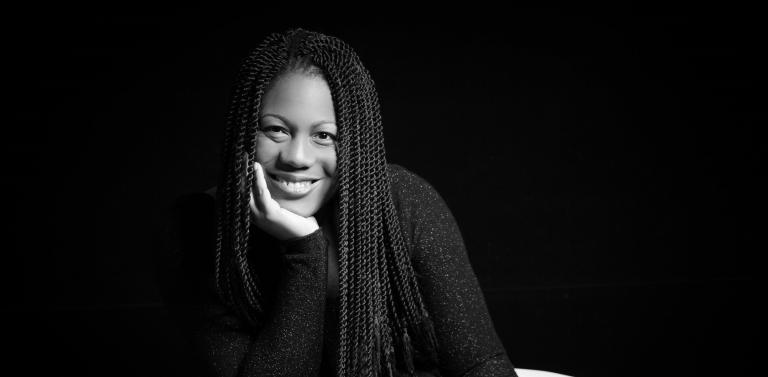If there’s one book your church small group needs to order for this fall, it’s Austin Channing Brown’s I’m Still Here: Black Dignity in a World Made For Whiteness. It’s probably one of the most apt uses of memoir that I’ve ever encountered. If you want to understand how racial dynamics play out in predominantly white space from the perspective of a black woman, this is the most accessible, informative narrative account I’ve come across. I had the honor of interviewing Austin about her book recently. The transcript is below.
MAG: Hey Austin, I wanted to start off by talking about the title of your book I’m Still Here: Black Dignity in a World Made for Whiteness. What does black dignity mean for you?
ACB: For me, black dignity references the inherent beauty, excellence, strength, creativeness of black people. Often diversity conversations these days focus on what people of color bring to white orgs, almost like we are commodities or tools. I want to convey that black people are endowed with dignity at birth and that should be the foundation when we have race conversations.
MAG: It sounds like in these diversity conversations black people are thought of as an exotic additive to a white-centered space. So it’s like whiteness is the soup and blackness is an herb that gets tossed in. What are the necessary ingredients for a healthier, more just race conversation?
ACB: I think an entire book could be written about what could be healthier! I think beginning with the inherent worth of black people (and other people of color is a must). Following the lead of people of color. Centering the experiences, intellect, and emotions of people of color is vital. Being clear about the purpose of the conversation is necessary. Having an experienced facilitator can make or break a conversation on race. Those are just a few examples! Ultimately, I would say, they shouldn’t be entered into lightly.
MAG: For sure. It’s definitely the case that many white organizations want to have the diversity conversation as a sort of moral checkbox for credibility sake but without intentionality beyond that. And by the way I hate the word diversity and I’ve learned the phrase reconciliation is problematic because it starts from a false premise of two parties with equal power. Is there a different word that better captures what an authentic race conversation could look like?
ACB: I understand, but I’m not sure voting certain words in or out is helpful. We just have to mean what we say. The problem is we use the words diversity, Justice, anti-racist, reconciliation, etc interchangeably. We should stop that. Words have meaning and we honor the conversation when we make sure we are choosing words that accurately convey our meaning. Having diversity present isn’t the same thing as having justice present. So we need to say what we mean. I use racial justice more often than I use anything else at this point. But I haven’t been willing to let go of the concept of racial reconciliation. I don’t need other people to use it. It’s not that deep for me. But I do think it conveys a certain level of hopefulness even after we have achieved justice- that we will be together, that we will continue to seek to be revolutionary, that we will continue to seek community, peace, creativeness… So I like it. But I’m clear that I don’t use the word lightly.
MAG: I like the idea of seeking to be revolutionary. That’s of course another word that has been bastardized by the market. What does it mean to you to be revolutionary?
ACB: There is a passage in Acts where the followers of the way of Jesus are accused of “turning the world upside down”. I love that! That’s what I think it means to be revolutionary. To turn everything that’s problematic, that’s normalized, that’s harmful- upside down. It requires such courage, creativity, community to think about what’s possible. And I think what it looks like to be revolutionary depends on context. There is so much to do- education, criminal justice, the Church, health…. the potential for being revolutionary is endless.
MAG: One of my favorite passages in the Bible is 1 Corinthians 1:28 where the apostle Paul says that God has chosen those who are despised nobodies to bring to nothing the things that are. What would church look like if that level of revolution were actually happening? Do you think that the institutional church can be redeemed or is it too corrupted by white supremacy and colonialism? Revolution often implies utter discontinuity with the past, like new wineskins for new wine. How much do you think we can keep and how much do we need to start over?
ACB: I don’t believe anything is beyond the redemption of the divine. And also. That’s a whole lot of redeeming to be done. I think the Church is always capable of pushing us forward or pushing us back. It always has been. Pro slavery and anti slavery. Pro Jim Crow and anti Jim crow. I think this political season is no different. It will be full of revolution and full of staunchly supporting the world as it is. I’m excited about womanism, about affirming churches, about Beyonce mass, and rethinking Bible study, and doing church differently. I’m excited about the poor people’s campaign and the many ways the Church is still seeking justice in the world.
MAG: So you’ve got an awesome first sentence in your book: “White people can be exhausting.” I don’t think any self-aware white person would disagree with that. We exhaust ourselves and exhaust each other. The way I experience that is that white people are filled with shame and fear about their legitimacy so they’re constantly trying to prove their worth. How have you experienced white exhaustion?
ACB: Oh man. I wrote a whole book on it. First I have to say that I take great delight in how much that first sentence resonates with people of color and makes white people smile. I didn’t really know if that first sentence would kill sales, you know? And I’m so pleased that people *get it*. That being said, there really are a million ways white people can be exhausting. And I write the book in an attempt to show progressive white peoples (or those who are committed to seeking racial justice) how even they can still be exhausting. I’m trying to say that there are many ways in which white people really want me to be like them in order to be acceptable. There are many ways in which the exhaustion comes from not being able to correct whiteness without repercussions. Perhaps it’s ultimately exhausting that whiteness believes it can *arrive* – that it can reach the end of the journey, that there is nothing left to learn.
MAG: My suspicion is that when white people pretend they’ve arrived, it’s because they’re deeply afraid that they haven’t. Some of the most exhausting white people are what I call woketivists who basically know all the right “takes” and it’s still all about them. I can be that way myself sometimes.
ACB: Humility is a gift of God and in some ways is required to in order to continue casting off white supremacy.
MAG: True. So here’s something I wonder about. I know humble, gentle conservative people who seem like they’re in a better place to be non-toxic white people than highly fragile, exhibitionist white progressives because they’re actually teachable and empathetic and willing to admit their mistakes. Do you think white people can become racially just by simply getting the gospel even if they don’t have all the right terminology and analysis?
ACB: I think understanding the depth of the Gospel leads to a commitment to justice. And that commitment then inspires the further learning. If there is no desire for the terms, the analysis, the history- then I have to question the commitment. I think those things are necessary not as a measurement for one another but as a foundation for determining action steps and making change. We must remember that none of this is about individuals. This isn’t about my wokeness or yours. The reason being educated is important isn’t for us to stick our chests out like peacocks. It’s so that we can make good, we’ll-informed, humanizing, compassionate, helpful decisions. I think both may be examples of supremacist thinking- one believing nothing else needs to be learned besides the Gospel and the other believing one has all the answers…
MAG: That’s a good point. We could even say that a zeal for justice and understanding is an inherent fruit of true salvation. So this brings me to a question about the most radical thing I’ve ever read. In seminary, I went through James Cone’s God of the Oppressed where he pulled zero punches. I’m paraphrasing, but he says if white people want to be saved, they’ve got to become black. I have a feeling he would write that differently in the age of Rachel Dolezal. I tend to have a metaphorical interpretation of that statement that taking up my cross to follow Jesus inherently means a life of solidarity with marginalized people. What do you think of Dr. Cone’s statement?
ACB: I understand Cones words to mean the same. And I think Cone was clear that the goal isn’t to imitate blackness (Dolezal) but as you said to be in solidarity. And not only that but for the fate of white folks to be linked to that of black folks, if that makes sense. So for example, if you send your kids to the black school chances are you are going to seek greater funding for that school, vote in favor of that schools resources, etc… Cone has written much on Blackness and I would strongly encourage readers to dive deep into his books because his thoughts continue to be revolutionary. I never met Cone or had the pleasure of taking a class so I want to practice humility myself and not suggest I know more than I do.
MAG: For sure. One of the reasons I’ve been telling other white people that they need to order your book for their small groups and discuss it is because you say things that white people often view as “harsh” but they’re contextualized in a narrative frame where those statements make complete sense based on your lived experience. I’ve been on the racial justice journey for about twenty years and my mind was still completely blown by what you had to share. Of course I also realize that I’m probably not your primary audience; maybe I’m just eavesdropping on the solidarity and encouragement you’re sharing with other black folks. So it makes me wonder how your book should be read. It would seem like being a black person in a predominantly white small group reading your book could really suck. Do you think white and black people should caucus separately to read your book or do you have other thoughts about how this book can be used as part of a racial justice conversation?
ACB: I definitely wrote this book with black woman at the forefront of my mind. Every sentence I wrote asking myself- how will this read to other black women like me? I wanted those who have a similar experience to mine to feel seen and heard, to know they are not alone. But I certainly knew that white people would be reading the book. And I hoped that those who were ready- those who care about black woman, black friends, black co-workers, black family members would gain much from the words. As discussions unfold, I hope that any space where white folks are in the majority- that they will be cognizant of the power that wields. That they will reconsider how to approach the content, that they will be mindful of empowering the person of color, that they will practice humility and ask why there is only one person of color among them. And I also hope… That the one back person will feel free to say “nope” I won’t be participating in that. Or I’m only participating on these terms… Or here is what I need to participate….
MAG: Makes sense. How can white people learn from the wisdom and beauty of black literature and culture that is made primarily for black people in a way that isn’t commoditizing or appropriative?
ACB: Well, white people could enjoy it and then determine not to commodify it. Just because white folks learn something new through black lit, doesn’t mean they need to write a book, create a music video, teach at the conference, etc. But again that would require a certain level of conscious humility. And the other thing white folks could do is simply say “I’m enjoying this, you should pick up up”. Toni Morrison should be read widely. Let’s give our monies to Tayari Jones and Terry Mcmillian. How about bringing in Coates and Gay and other brilliant black thinkers and lay them for their work? Commodifying folks work is not the same thing as appreciating it.
MAG: Thanks so much for your time. I really do think your book is one of the most important books to come out this year. I think it’s one of the best uses of memoir that I’ve seen.
Get a copy of Austin’s book I’m Still Here: Black Dignity in a World Made for Whiteness!

















